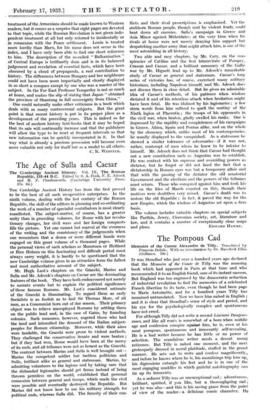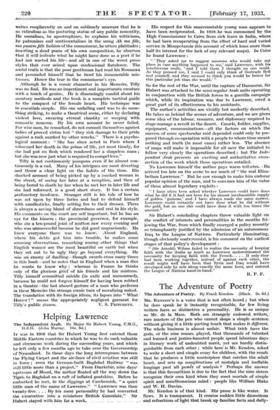The Pompous Cad
Memoirs of the Comte Alexandre de Tilly. Translated by Francois Debate. With an introduction by Dr. Havelock Ellis, (Gollimcz. 18s.)
Jr was Stendhal who just over a hundred years ago declared that the Memoirs of the Comte de Tilly was the amusing book which had appeared in Paris at that time and who recommended it to an English friend, sure of its instant success. But England was too engrossed by the democratic seduction of industrial revolution to find the memories of a celebrated French libertine to its taste, even though he had been page to Marie Antoinette, and for a hundred years Tilly has remained untranslated. Now we have him naked in English ; and it is clear that Stendhars sense of style and period, and his eye for the psychologically complex and spontaneous have not erred.
For although Tilly did not write a second Liaisons Dangeur- euses, and like all roues is somewhat of a bore when middle age and confession conspire against him, he is, even at his most pompous, spontaneous and innocently self-revealing. He is a bad writer because he has little or no power of selection. The scandalous writer needs a decent moral reticence. But Tilly is naked one moment, and the next grotesquely dressed in moral platitude, stuffed in the grand manner. He sets out to write and confess magnificently, and before he knows where he is, his moralizings trip him up, his digressions entangle his feet and he is in one of the most engaging muddles in which guileful autobiography can
tie up its innocents.
As a seducer Tilly was an unexceptional cad ; adventurous, brilliant, spirited, if you like, but a thoroughgoing cad ; yet he was also—and this is his saving grace from the point of view of the reader—a delicious comic character. He writes conplacently on and on sublimely unaware that he is as ridiculous as the posturing statue.of any public nonentity. He moralizes, he apostrophizes, he explains his - witticisms, he patronizes and sentimentalizes in the smug Ah rna Ina pawore fille fashion of the connoisseur, he utters platitudes ; inserting a dead poem of his own composition, he observes that it will indicate what he might have done as a poet if he had not wasted his life—and all in one of the worst prose styles that ever seized upon confessional flatulence. The awful truth is that the poor gentleman had read his Rousseau and persuaded himself that he loved his innumerable mis- tresses. Hence the tear in the connoisseur's eye.
Althoughhe is a comic character in his Memoirs, Tilly was no fool. He was an impertinent and importunate creature with a touch of genius.. He is disarmingly candid about his amatory methods and the book is a complete tactical guide to the conquest of the female heart. His technique was in essentials simple. His one unfailing card was to do some- thing striking, to make a theatrical scene, either by declaring violent love, swearing eternal chastity or weeping with romantic remorse. By his own account he never failed. For wise rnen, he remarked, do not commit themselves against ladies of proved virtue lest "they risk damage to their pride against a rock marked by other wrecks." There is a psycho- logical moment : "She has since acted in Paris where I witnessed her death in the prime of life, yet most timely, for she had put on flesh which rendered her a shapeless mass ; but she was now just what is required to compel love."
Tilly is not continuously pompous even if he almost con- tinuously is a cad. Many of his intrigues are most diverting and throw a clear light on the habits of the time. His shocked account of being picked up by a masked woman in the street, of seeing her later at a reception, and then of being bored to death by her when he met her in later life and she had reformed, is a good short story. It has a certain perfunctory insolence. Stranger still is his tale of how he was set upon by three furies and had to defend himself with candlesticks, finally setting fire to their dresses. There is always a saving blend of shrewdness and zest in his style. Ills comments on the court are self important, but he has an eye for the bizarre ; the provincial governor, for example, who ate a ten-pound joint of mutton raw every evening and who was unsuccessful because he did good ungraciously. He knew everyone there was to know. About England, where his debts got him into trouble, he makes some amusing observations, remarking among other things that English women are the most beautiful on earth but when they set out to be ugly they go beyond everything. He was an enemy of duelling—though swords cross many times in this book—and he notes that in England when a man dies he wants . to know why ; whereas in France he thinks - only of the glorious grief of his friends and his mistress. Tilly himself committed suicide (in exile and unmourned), because he could not forgive himself for having been robbed in a theatre—the last absurd gesture of a man who performs. in these Memoirs the strange comic turn of moralizing naked. The translation with its foreign idiom, its lapses into "What Horror I" seems the appropriately negligent garment for







































 Previous page
Previous page